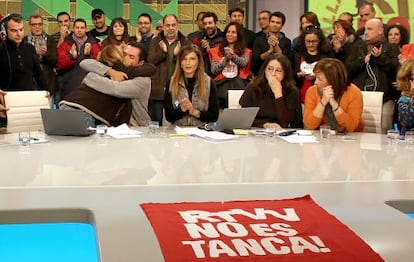A long, slow, and expensive death
Valencia’s public broadcaster RTVV has outstanding debts of more than a billion euros It is still paying its workforce of 1,608 employees, despite having closed four months ago


Since the regional government of Valencia shut down publicly funded broadcaster Ràdio Televisión Valenciana (RTVV) at the end of November, it has spent some 18 million euros on wages for staff, the majority of whom are not allowed to enter RTVV’s broadcasting center in Burjassot, a few kilometers outside Valencia.
The company’s creditors, mainly German banks, are refusing to allow RTVV – which includes television broadcaster Canal 9 and radio station Radio 9 – to close down completely and pass on its debt to the regional government.
Until the debt can be repaid, a team of around 100 people has been kept on to carry out the closure, a process that will probably take until the middle of next year. Meanwhile, many of the 1,608-strong workforce are pursuing legal action against RTVV for unfair dismissal.
Regional premier Alberto Fabra of the Popular Party (PP) decided to close the station, set up in 1989, after a court overruled his plan to sack around 1,000 of the workforce. He said that readmitting the employees would have cost the government 40 million euros, which he said was not acceptable at a time of spending cuts to education, health, and other public services.
Since then, the regional government has been spending around 4.5 million euros a month on salaries, renting equipment and other fixed costs. It says it will continue winding down RTVV’s operations in the meantime.
So far, no agreement has been reached between the sacked employees and RTVV, which is refusing to relocate 180 former employees who joined the company to other government positions.
The network was widely seen as a propaganda tool of the PP regional government
Meanwhile, the Socialist Party has brought the matter before the Constitutional Court, accusing the regional government of “attacking the democratic, cultural and social rights of the Valencian people” in closing the station. The PP has used its absolute majority in the regional parliament to block a Socialist Party motion to protect RTVV’s publicly owned assets.
RTVV ran up a debt of 1.2 billion euros, in part, say critics, because it was badly managed, and paid excessive salaries to senior staff appointed for their political loyalty.
Originally set up to promote Valencia’s language and culture, the network’s credibility diminished over the last decade, and was widely seen as a propaganda tool of the PP regional government. As a result, viewing figures fell, while it became involved in several corruption, waste, and cronyism scandals. In the month following Fabra’s decision to close the broadcaster, it performed a volte-face, taking a more critical line of the PP’s management of both the regional government and RTVV. More opposition representatives appeared on RTVV in the last month of its life than in the previous 10 years. The network reported on previously avoided topics such as the Gürtel kickbacks-for-contracts corruption investigation, part of which included Canal 9’s broadcasting of Pope Benedict’s 2006 visit to Valencia, for which businessmen and politicians involved in Gürtel received backhanders worth over three million euros.
In late November the judge overseeing the Gürtel investigation extended reporting restrictions on the case affecting RTVV, prompting some opposition politicians to link the decision to close the network as soon as possible with the investigation.
Tu suscripción se está usando en otro dispositivo
¿Quieres añadir otro usuario a tu suscripción?
Si continúas leyendo en este dispositivo, no se podrá leer en el otro.
FlechaTu suscripción se está usando en otro dispositivo y solo puedes acceder a EL PAÍS desde un dispositivo a la vez.
Si quieres compartir tu cuenta, cambia tu suscripción a la modalidad Premium, así podrás añadir otro usuario. Cada uno accederá con su propia cuenta de email, lo que os permitirá personalizar vuestra experiencia en EL PAÍS.
En el caso de no saber quién está usando tu cuenta, te recomendamos cambiar tu contraseña aquí.
Si decides continuar compartiendo tu cuenta, este mensaje se mostrará en tu dispositivo y en el de la otra persona que está usando tu cuenta de forma indefinida, afectando a tu experiencia de lectura. Puedes consultar aquí los términos y condiciones de la suscripción digital.









































